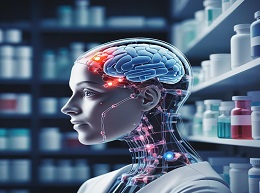The Role of AI in Drug Discovery and Healthcare Research

Artificial intelligence (AI) has emerged as a powerful tool in the field of drug discovery and healthcare research, revolutionizing the way scientists approach medical innovation. This article delves into the role of AI in transforming drug discovery processes, accelerating research timelines, and unlocking new possibilities for the treatment of various diseases.
Understanding AI in Drug Discovery
The Traditional Drug Discovery Process
Drug discovery is a complex and time-consuming process that involves identifying potential drug candidates, testing their efficacy and safety, and bringing them to market. Traditionally, this process relied heavily on trial and error, with researchers screening large libraries of compounds to identify promising candidates.
AI-Powered Drug Discovery
AI has revolutionized drug discovery by harnessing the power of machine learning algorithms to analyze vast amounts of biological and chemical data. These algorithms can predict the properties of molecules, identify potential drug targets, and even design novel compounds with specific therapeutic properties, significantly speeding up the drug discovery process.
Applications of AI in Healthcare Research
Drug Target Identification
AI algorithms analyze biological data to identify potential drug targets, such as proteins or genes associated with specific diseases. For example, BenevolentAI's AI platform identified a potential drug target for amyotrophic lateral sclerosis (ALS), leading to the development of a promising new therapy currently in clinical trials.
Compound Screening and Design
AI algorithms can screen large libraries of compounds to identify potential drug candidates with desired properties, such as efficacy and safety. Additionally, AI can design novel compounds with specific molecular structures optimized for therapeutic activity, accelerating the discovery of new drugs.
Impact on Medical Innovation
Accelerated Research Timelines
AI-powered drug discovery significantly accelerates research timelines by automating and streamlining various stages of the drug discovery process. By analyzing vast datasets and predicting the properties of potential drug candidates, AI enables researchers to prioritize the most promising compounds for further testing, reducing the time and resources required for drug development.
Precision Medicine and Personalized Treatments
AI enables the development of precision medicine approaches that tailor treatments to individual patients based on their genetic makeup, lifestyle, and medical history. For example, IBM's Watson for Oncology analyzes patient data to recommend personalized treatment options for cancer patients, improving treatment outcomes and reducing adverse effects.
Challenges and Considerations
Data Quality and Availability
The success of AI in drug discovery depends on the quality and availability of data. Researchers must ensure that the data used to train AI models is accurate, representative, and sufficiently diverse to avoid bias and ensure the reliability of predictions.
Regulatory and Ethical Considerations
As AI becomes increasingly integrated into drug discovery processes, regulatory bodies and ethical considerations become paramount. Regulators must establish guidelines for the use of AI in healthcare research, ensuring the safety, efficacy, and ethical implications of AI-driven treatments.
Future Trends and Opportunities
Collaboration and Interdisciplinary Research
The future of AI in drug discovery lies in collaboration and interdisciplinary research, bringing together experts from various fields, including biology, chemistry, computer science, and data analytics. By combining diverse perspectives and expertise, researchers can harness the full potential of AI to drive medical innovation.
Integration with Emerging Technologies
AI will continue to integrate with emerging technologies such as genomics, proteomics, and advanced imaging techniques, enabling more comprehensive and personalized approaches to drug discovery and healthcare research.
Conclusion
AI is revolutionizing drug discovery and healthcare research, accelerating research timelines, and unlocking new possibilities for medical innovation. By harnessing the power of machine learning algorithms, researchers can analyze vast amounts of biological and chemical data to identify potential drug candidates, design novel compounds, and develop personalized treatments tailored to individual patients. As AI technologies continue to advance, the future of drug discovery holds promise for more effective, precise, and personalized therapies for a wide range of diseases.